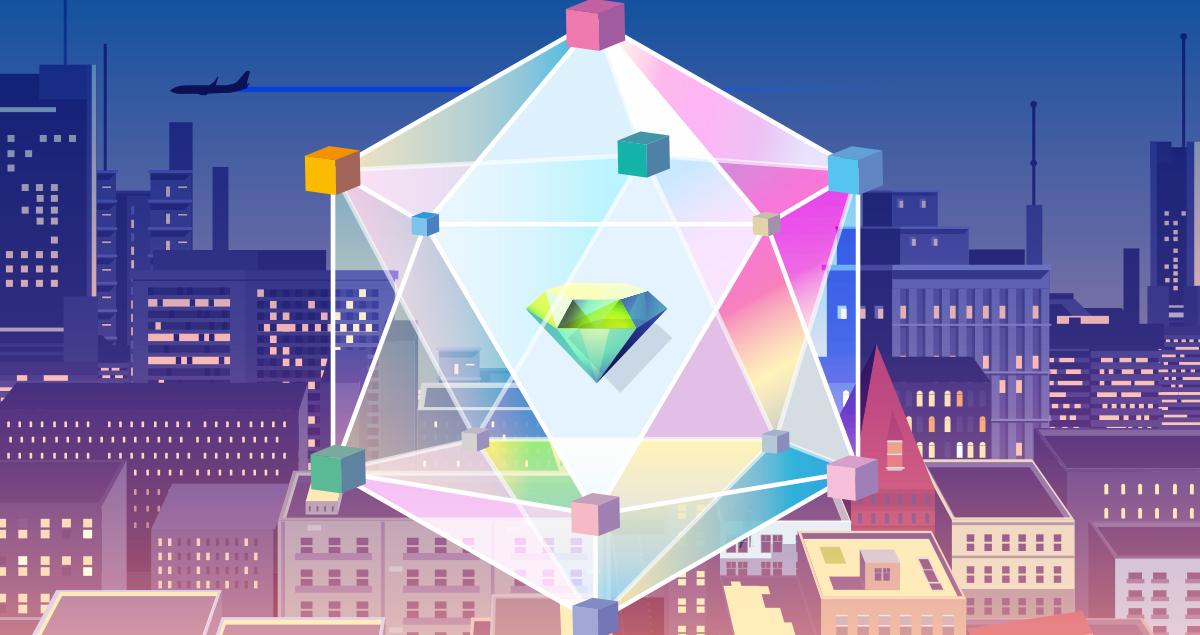The blockchain revolution is coming

The world of PtoP is here
These days, Bitcoin is a frequent topic of discussion. Many may associate it with "investments" or "money-making", but this is a misguided interpretation. Instead, Bitcoin and the underlying blockchain is a technology that promotes progress worldwide.
Currently about 2.1 billion people around the world are using the internet via smartphones and this number is sure to increase, though it will top out at about 7 billion, the entire world population. However, it is expected that about 30 billion “things” (devices) will be connected to the internet by 2020, reaching a trillion by 2025. Every “thing” will be connected to the internet. The era of IoT has begun.
The rapid expansion of IoT is of great concern as the current centralized structure of the internet comprehensively collects data and doesn’t allow for device-to-device communication without authentication via a specific server. As the number of devices connecting to the internet increases, the server is sure to crash. In the near future, a lot of “things” will operate autonomously via AI. Work has already begun to integrate diverse data through the connection of things. This is where a massive server overload could destroy the conventional centralized structure of the internet.
PtoP (Peer to Peer) networks will play an integral part of our future. We are at the threshold of a world where devices can exchange information through direct communication, authenticating and proving that all information is true and correct without needing to go through a specific server. As of 2017, the only system in existence that realizes this is the Crypto currency, Bitcoin. Bitcoin has utilized PtoP authentication technology, exchanging value without any third party intervention for nine years without any problems. The blockchain is what makes this possible. Where centralized servers carry the risk of intentional tampering and cyber attacks, blockchains can eliminate these problems, making it a revolutionary technology indispensable for the future.
Protecting Crypto currency from fraud
In October 2008 someone going by the name of Satoshi Nakamoto posted a White Paper on the internet proposing the idea of Bitcoin. Originally, the Bitcoin currency was only created for use by Nakamoto’s group of friends and colleagues. They discussed how to protect the currency from sudden fluctuations in value and fraud, deciding that everything should be recorded on a shared ledger. They recorded the amount of money each person had and every time a transfer was made it was recorded on the ledger, which was then updated in a block and shared with all members. As new members join, a copy of the ledger is given to them so everyone can see how much money someone has right from the start.
As each new record block is updated it links together with previous blocks making a chain. This is known as the blockchain. Even if someone tries to manipulate the ledger they are eventually caught out as all members share the exact same records, resulting in the creation of a system that is extremely hard to manipulate and that enables PtoP authentication. Bitcoin and transaction ledgers are spreading all over the world, continuously improving the level of safety. The expansion of Bitcoin is inevitable.
Blockchains could ensure vegetable quality
The blockchain is a by-product of Bitcoin, but its application range is infinite. I strongly believe the blockchain is a great invention that can be extended beyond the internet and I’m sure the concept will be applied to all industries in future. One example is quality assurance. Recently, there has been talk about data alteration in Japanese companies which is becoming a global problem. Going forward, blockchain technology will surely become indispensable for quality assurance. If quality inspection data was set up in a blockchain system, no one would be able to alter that data and should anyone try, the evidence would be permanently recorded. If blockchains became common practice, fraudulent data would surely become an issue of the past.
An active example of blockchain application is the traceability of agricultural products. In Aya-cho, Higashi Morokata-gun, Miyazaki Prefecture, Japan, demonstration experiments are being carried out using blockchain technology to assure quality organic agricultural products. The data recorded includes who farmed the product, condition of the soil, nature of the pesticides and production environment. This proves the quality of the product. These agricultural products are attracting great attention and are traded at almost twice the market price.
In the manufacturing industry traceability of parts has been advancing significantly. The same cannot be said for that of software, though the role of software in terms of products and services will become more significant in future. When this happens, we must assure the quality of the software by disclosing who wrote the program and how it was written. The blockchain should be an important part of this.
Keep information in a virtual safe
In the years to come, a company’s survival will greatly depend on “the amount of useful information” it possesses. One example is Uber, a car dispatch service provider. They are a well-known business, but I am sure they are looking further into the future to see “how they can optimize the huge customer data base they possess for their next business endeavor.” Uber may just completely change the logistics of the world by making use of “movement of people” data accumulated by their dispatch service. I don’t think there is a company in all of Japan that thinks quite so deeply.
Since the introduction of IoT the number of data-collecting sensors and amount of information collected from them has dramatically increased. However, there are too many companies that use a low security system to manage the information. Japan is a developed country of manufacturing, and is the only country that can create its own social infrastructure from beginning to end. If Japanese manufacturing companies were to turn their expertise into data and store it in a trustworthy blockchain, it would have huge value. Requests would come from all over the world from those who want to analyze the data. Furthermore, utilization of this data could bring about new innovation, such as never-before-seen refining of strong metals. In order to make use of this data, we have to keep it in a safe. That safe is a blockchain.





